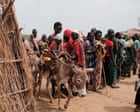
In recent days, a series of significant events have unfolded across the Middle East and Eastern Europe, each shedding light on continuing tensions and conflicts. This article brings together a selection of noteworthy incidents, highlighting the complex interplay of local and international dynamics.
In Sudan, reports have surfaced regarding the actions of the paramilitary Rapid Support Forces (RSF) in the North Kordofan state. Allegations suggest that the RSF has been involved in the deaths of nearly 300 individuals in a series of raids. The claims, made by Sudanese activists and human rights groups, indicate that the areas targeted by the RSF were devoid of military significance, raising significant humanitarian concerns. This development underscores the ongoing strife in Sudan, where the RSF has been engaged in conflict with Sudanese government forces since April 2023, indicating a region mired in chaos and calling for vigilant international monitoring.
In a related vein of conflict, Ukraine finds itself grappling with an internal security threat following the assassination of Col. Ivan Voronych, a Ukrainian intelligence officer. The responsibility for this act has been claimed by a faction of “The Base,” a far-right extremist group with alleged ties to Russia. The incident, which transpired in a Kyiv parking lot, highlights the volatile security situation in Ukraine. The group’s announcement that this assassination is merely the beginning, further intensifies an already precarious geopolitical scenario and necessitates enhanced focus on domestic security strategies within Ukraine.
Moving to the Middle East, a tragic incident in Gaza’s Khan Younis has resulted in the deaths of at least twenty individuals. A crush occurred at an aid distribution point handled by the Israeli-backed Gaza Humanitarian Foundation, according to conflicting reports, with some attributions pointing to trampling while others mentioned suffocation as the cause of death. This event is a stark reminder of the humanitarian challenges and the dire need for structured aid management in the region. Meanwhile, in Syria, Israeli military operations have targeted forces in the city of Sweida, an area renowned for its Druze majority. These interventions reportedly disrupted the government’s brief deployment in response to sectarian clashes and resulted in further fatalities, spotlighting historical tensions in the region.
In another distressing note, the family of Sayfollah Musallet, a U.S. citizen who was killed in the West Bank, is urging the Trump administration to take decisive action. Musallet, a young man from Florida, was reportedly beaten to death by Israeli settlers while attempting to safeguard his family’s farm. This heart-wrenching incident has sparked criticism from his loved ones, who are calling on the U.S. government to hold those responsible accountable and highlight the complexities faced by dual citizens in conflict zones.
Lastly, Israel’s recent air strikes across its borders in Syria and Lebanon have drawn attention. The attacks targeted government forces in southern Syria and purported Hezbollah sites in Lebanon’s Bekaa Valley. These military actions are part of Israel’s broader regional security approach, aimed at countering threats perceived as emanating from neighboring states. The repercussions of these strikes resonate through an already fragile geopolitical landscape, underlining the importance of balanced diplomacy and peacekeeping efforts in the region.
As these events continue to evolve, they reinforce the critical need for diplomatic engagement and international oversight to ensure stability and peace in these intricate cross-border environments. Maintaining a vigilant focus on humanitarian and security challenges will be essential in addressing the underlying causes of these conflicts and fostering long-term resolutions.
Source: {link}
